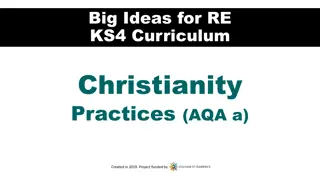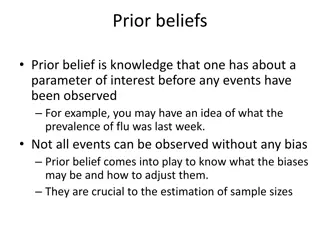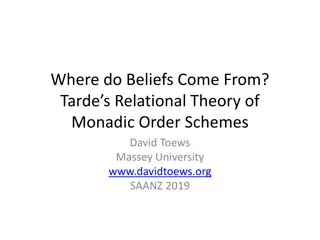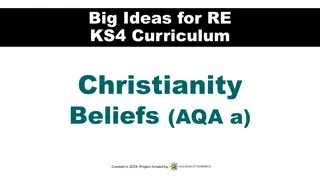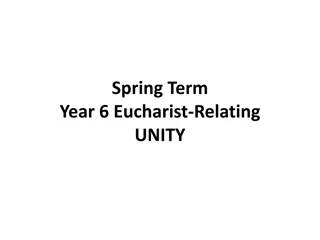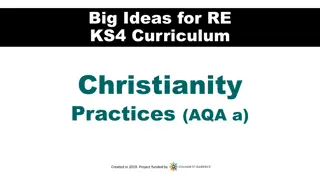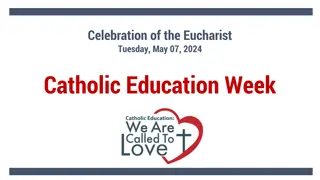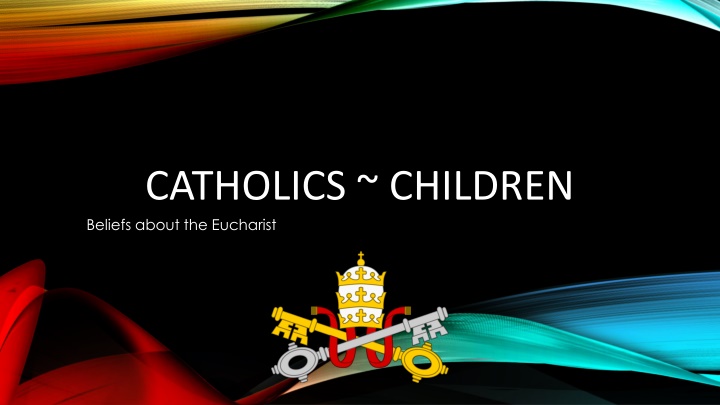
Beliefs About the Eucharist: Exploring Theological Perspectives
Dive into the various beliefs about the Eucharist held by different Christian denominations, including Transubstantiation, Consubstantiation, Sacramental Union, Pneumatic Presence, Memorialism, and Suspension. Explore the pros and cons of each theology and consider which perspective you find most convincing.
Download Presentation

Please find below an Image/Link to download the presentation.
The content on the website is provided AS IS for your information and personal use only. It may not be sold, licensed, or shared on other websites without obtaining consent from the author. If you encounter any issues during the download, it is possible that the publisher has removed the file from their server.
You are allowed to download the files provided on this website for personal or commercial use, subject to the condition that they are used lawfully. All files are the property of their respective owners.
The content on the website is provided AS IS for your information and personal use only. It may not be sold, licensed, or shared on other websites without obtaining consent from the author.
E N D
Presentation Transcript
CATHOLICS ~ CHILDREN Beliefs about the Eucharist
BELIEFS ABOUT THE EUCHARIST Beliefs about what happens at the Eucharist are concerned with the way in which the communicant s relationship with God is fed through this mystical meal. Transubstantiation The Catholic Church teaches a belief in Transubstantiation (see p.69). A very similar position is held by the Orthodox Church which refers to the Eucharist as the Divine Liturgy . The real difference between the Eastern and Western Churches is that the Orthodox Church does not state when the actual change takes place whilst the Catholic Church does.
BELIEFS ABOUT THE EUCHARIST Consubstantiation The bread retains its substance and Christ s glorified body comes down into the bread through the consecration and is found there together with the natural substance of the bread, without quantity but whole and complete in every part of the sacramental bread. (This belief was held by the English Lollards q.v.) Sacramental union In the use of the sacrament, according to the words of Jesus Christ and by the power of his speaking of them once for all, the consecrated bread is united with his body and the consecrated wine with his blood for all communicants, whether believing or unbelieving, to eat and drink. This is the theology of the Lutheran Church.
BELIEFS ABOUT THE EUCHARIST Objective reality Objective reality, but pious silence about technicalities ( divine [or holy] mystery ) is the view of many Anglicans (including Anglo-Catholics) and Methodists. While they agree that in the sacrament the bread and the wine are really and truly changed into the body and the blood of Christ they do not attempt to explain this further. Pneumatic presence (Receptionism) Real Spiritual presence , also called pneumatic presence or Receptionism says that not only the Spirit of Christ, but also the true body and blood of Jesus Christ are received by the power of the Holy Spirit but only by those with faith. This view is held by some Anglicans, and other Reformed Christians.
BELIEFS ABOUT THE EUCHARIST Memorialism The bread and wine symbolise the body and blood of Jesus Christ, and consuming them, the believer commemorates the death of Christ. Therefore Christ is not present in the sacrament, except in the minds and hearts of the communicants. Suspension This view of the events of the Last Supper is that the taking of bread and wine was not intended to be a perpetual instruction and was not to become a religious ceremony. This view is shared by the Religious Society of Friends (Quakers) and the Salvation Army.
BELIEFS ABOUT THE EUCHARIST Task 1 Create a table showing what you believe to be the pros and cons of each of these theologies. 2 Write a short essay explaining which of the theologies you think might be considered to be the most convincing.








